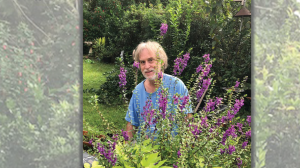Hope and Healing: Armstrong Family Establishes Fund for Glioblastoma Research
Kindness. Intelligence. Caring. These are just some of the words that John Armstrong’s loved ones use to describe him. John’s death in February 2023, just six months after being diagnosed with glioblastoma, left a deep void in the family’s lives.
With the desire to prevent others from experiencing a similar ordeal, John’s widow, Peggy Armstrong, created the John Rhea Armstrong Memorial Fund to support glioblastoma research at the Preston Robert Tisch Brain Tumor Center at Duke. After exploring glioblastoma programs around the country, Peggy chose to establish a generous bequest at Duke because of the high-quality research being done.
John’s brother-in-law, Gerry Blobe, MD, PhD, professor of medicine, cell biology, and pharmacology and cancer biology at Duke University School of Medicine, recommended that John visit Duke for a consultation with neurosurgeon Peter E. Fecci, MD, PhD, director of the Duke Brain Tumor Immunotherapy Program. Although John wished to be treated at Duke, his insurance company stipulated that his treatment take place in Florida, where he and Peggy lived. Despite the fact that John was not a patient at Duke, both Katy Peters, MD, PhD, FAAN, professor of neurosurgery and neurology, and Henry S. Friedman, MD, James B. Powell, Jr. Distinguished Professor and deputy director at the Preston Robert Tisch Brain Tumor Center, offered advice to the family during John’s treatment, a kindness the family appreciated.
Kindness was a central element in the Armstrongs’ marriage. “We were married for 43 and a half years, and in all that time, I never heard him raise his voice,” said Peggy. Describing her high school sweetheart as a scientist first and foremost, Peggy said John would be glad that their resources will be used for scientific research.
With a love of nature nurtured in the hills near his childhood home in Rogersville, Tennessee, John earned undergraduate and graduate degrees in geology and spent most of his career working in the Florida Department of Environmental Protection. “John left very small footprints on the planet and a big impression on our hearts,” his brother Joe said.
John and Peggy cultivated a beautiful home garden that always included nasturtiums, which he sent each year to his two brothers and two sisters. John’s sister, Madeline Blobe, said John fondly recalled spending time as a child with their mom planting nasturtiums, which he loved to check daily, waiting for them to bloom. The yearly gifts of flowers to his siblings were a testament to their childhood bond.
Madeline describes her brother as a quiet, unassuming, and generous person. “Using the money that he was able to save in his lifetime to further scientific research that could help other people live longer and improve treatments would have made John happy,” she said. “With this extremely unexpected thing happening to him so fast, you try to believe that there's a reason for it. If somehow what he went through could keep someone else from experiencing this, then maybe we can all understand it better.”
In deciding which cancer center would be the beneficiary of her planned gift, Peggy explored the Facebook page “GBM Survivors to Thrivers,” where she connected with women who were pleased with the care their spouses had received at Duke. But the recommendation that meant the most to her was from Gerry Blobe, who knows firsthand the caliber of Duke’s research.
“Glioblastoma is such a horrible disease,” said Peggy. “I wanted to do something that could help other people so that they wouldn't have to go through this. I hope that this gift is key to finding a better treatment or even just hope for others.



